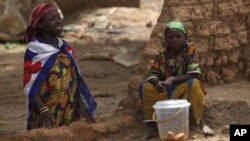ABUJA — The Nigerian government is preparing to release more than $4 million to clean up the site of the worst outbreak of lead poisoning in modern history.
International aid group Doctors Without Borders says it fears that without measures to ensure the funds reach the communities, thousands more children could be infected by what they call "staggering" levels of poison.
A few years ago, gold prices surged and small-time miners in Nigeria’s Zamfara State increased their incomes as much as tenfold, to $10 or $15 a day. Since then, lead poisoning associated with the mining has killed hundreds of children and about 4,000 are still sick.
In June, the Nigerian government pledged more than $4 million to clean up the lead.
Now, as they get ready to disperse the funds, some people worry that with so much cash being spread around in a country well known for corruption, some of the funds may disappear.
“I think everyone in Nigeria has seen programs gone awry due to issues of accountability. It is my fervent hope that this will be an exception because this is not a game. Children are dying. It’s really important that corruption not derail this effort,” said Ivan Gayton, head of Nigeria’s Doctors Without Borders.
He says thousands more children could be infected, risking death or severe brain damage if the cleanup is not successful. Human Rights Watch says children have been found in Zamfara with as much as 70 times the amount of lead in their blood than is considered safe.
But Gayton says people continue gold mining despite the danger. He says if authorities attempt to enforce a recently-reported ban on gold mining, it will only drive miners underground. Fear already keeps many parents from reporting that their children are sick, he says.
“People are very poor there and when they come across this fairly lucrative economic activity they can do they’re afraid to lose it. And I have to say, if it’s a choice between poisoning your child in the future but being able to feed your child today," said Gayton. "It may sound easy for us to say, ‘Well, you shouldn’t do this.’ But it's very hard to not go out and earn the money that allows you [to] feed your child today.”
Gayton says after the villages are cleaned up, safer mining practices need to be put into place and sick children need treatment. He says he hopes that some of the government funds allocated for clean-up will be diverted towards establishing safer mines for the future and urges authorities to both literally and figuratively “get the lead out.”
International aid group Doctors Without Borders says it fears that without measures to ensure the funds reach the communities, thousands more children could be infected by what they call "staggering" levels of poison.
A few years ago, gold prices surged and small-time miners in Nigeria’s Zamfara State increased their incomes as much as tenfold, to $10 or $15 a day. Since then, lead poisoning associated with the mining has killed hundreds of children and about 4,000 are still sick.
In June, the Nigerian government pledged more than $4 million to clean up the lead.
Now, as they get ready to disperse the funds, some people worry that with so much cash being spread around in a country well known for corruption, some of the funds may disappear.
“I think everyone in Nigeria has seen programs gone awry due to issues of accountability. It is my fervent hope that this will be an exception because this is not a game. Children are dying. It’s really important that corruption not derail this effort,” said Ivan Gayton, head of Nigeria’s Doctors Without Borders.
He says thousands more children could be infected, risking death or severe brain damage if the cleanup is not successful. Human Rights Watch says children have been found in Zamfara with as much as 70 times the amount of lead in their blood than is considered safe.
But Gayton says people continue gold mining despite the danger. He says if authorities attempt to enforce a recently-reported ban on gold mining, it will only drive miners underground. Fear already keeps many parents from reporting that their children are sick, he says.
“People are very poor there and when they come across this fairly lucrative economic activity they can do they’re afraid to lose it. And I have to say, if it’s a choice between poisoning your child in the future but being able to feed your child today," said Gayton. "It may sound easy for us to say, ‘Well, you shouldn’t do this.’ But it's very hard to not go out and earn the money that allows you [to] feed your child today.”
Gayton says after the villages are cleaned up, safer mining practices need to be put into place and sick children need treatment. He says he hopes that some of the government funds allocated for clean-up will be diverted towards establishing safer mines for the future and urges authorities to both literally and figuratively “get the lead out.”





